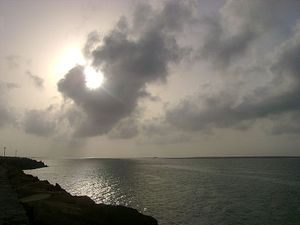Pakistan is party to a number of international conventions and treaties for protection of the environment and biodiversity. Under the obligations of these treaties and agreements, Pakistan has vowed to protect its marine environment as well. Despite all this, one of the biggest issues Pakistan is facing right now is environmental degradation. This not only depletes Pakistan’s resources but is also affecting human life adversely.
The environment of Pakistan is being degraded in several ways, one of which is oceanic pollution. Despite being part of the London Convention on the Prevention of Marine Pollution by Dumping of Wastes and Other Matter, Pakistan throws all sort of waste into the sea, including plastic bags, bottles, sewage, and potentially infectious hospital waste. Due to this large-scale violation of the convention, the natural blue-colored water at the famous tourist point in Karachi, Sea View, has turned black.
The world-famous ship breaking industry in Gadani is the main source of discharging heavy metal impurities into the sea. Karachi has many industrial zones but is deficient in proper waste management systems. The hazardous industrial waste eventually finds its way into the sea. The fish and other marine life swallows small particles of metals, plastic, and toxic substances. Completing the food chain, these fish are eaten by humans and the toxic substances can severely damage their immune systems. In other words, humans are bringing death to themselves.
Increasing dumping of hazardous waste, including cow dung, untreated water, and industrial waste, and a large quantity of plastic into the sea is severely affecting the fisheries resources, which in turn negatively impacts the economic conditions of fishing communities highly dependent on these resources. According to research conducted by WWF, 65 percent of the litter on the coastal areas consists of plastic bottles, wrappers, bags, disposable utensils, etc.
Pakistan must not allow untreated waste to be dumped into the sea as agreed in the London Convention. Proper waste treatment plants must be installed at industrial sites. International standards should be followed for the waste that is to be dumped into the sea. The government should encourage the construction of treatment plants and punish nonabiding industries with heavy penalties. The money generated by this initiative can be used for environment friendly projects.
The Monaco model can be followed in this regard. The tiny state on the coastline of France has effectively implemented its policy of “Responsible Trading.” The government encourages environment friendly industries through subsidies and other incentives. Pakistan’s economy may not be in good enough condition to give subsidies, but ecofriendly industries can still be be encouraged at the governmental level. The dumping of hazardous waste can be checked by the authorities and businesses convinced to have treatment plants that measure up to international standards.
Pakistan is facing an existential threat from environmental degradation. It is not the government’s responsibility alone to tackle these issues. All the citizens of Pakistan need to play their role in taking care of the sea. Pakistanis can take responsibility at the individual level and play a part by not throwing away waste at the coast and into the sea. They must bring out the best out of themselves to preserve the natural environment.
Syed Anwar-ul-Haq Gillani is currently studying international relations at National Defence University, Islamabad.

































